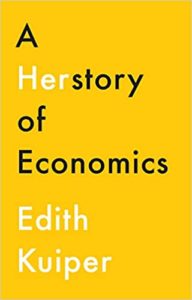1)Could you please explain what feminist economics is? I suspect many people haven’t heard of the field. What are its principles? How did it develop?
Feminist Economics is a new paradigm in Economics that takes women and gender (including race, class, age, and other identities) into account. The economics discipline and mainstream economics were developed during a period of Western history in which women (and other people) did not have access to higher education, universities, and other places where economic debates and theory building took place. Those who did have access were mainly if not exclusively white European upper-middle class men. So, it was their experiences, interests, ideas, and questions that defined economics as a field of study and later as a science.

Including the experience and insights of women and people formerly excluded from economics appears to have a fundamental impact on what questions are being asked, what answers are being considered satisfactory, what methods are considered appropriate, which topics and issues are being addressed. Simply put: who makes the decision in Economics what quality research entails, determines the direction in which the field develops. Feminist Economics studies and aims to explain the experience of women, men, and other people. Feminist economists do not exclusively focus on women, but simply also include and explain the behavior of women, children, older people, gay and trans people, etc. in their research. This makes that Feminist Economics aims not only to build new theories but also more broadly to transform the economics discipline as a whole.
Feminist Economics has a long history, but the field under this name started to take off in the late 1980s, early 1990s. At that point there were enough women economists (including economics students) who were engaged in economics to form groups, organize conferences, and conduct economic research in a critical mass. A lot of these people started to ask questions about women and gathered data that had not been available before. In the early 1990s economists moved to critiquing mainstream economics and other theories like Marxist and Institutionalist theories from a gender perspective. This happened along the development of critiques on economic methods used in mainstream economic research (mostly quantitative), the way the history of economics was told (by focusing exclusively on white middle class European and American men) and traditional economic policy making. During these years feminist economists started the International Association for Feminist Economics (IAFFE) in 1992 and the Journal Feminist Economics in 1995.
2) What is the stand of feminist economists in the profession, how do mainstream economists treat you and your colleagues?
Feminist economists are working in practically all subfields of economics, from macroeconomics, labor economics, finance, history of economics, to development economics. In the early years, it was very difficult to be engaged in feminist economic research while untenured as there was a substantial risk you could lose your job over doing that. There was, and to some extend still is, quite a bit discrimination of women going on. You can only imagine how things were for women of color. When women economists in addition, also studied women’s economic behavior, it was very difficult to make a career in economics. This has improved over the years, although the field of feminist economics is not yet fully recognized. For a lot of economists, it requires time and retraining that not everyone is willing to do. Feminist economic research has received full recognition, though, in development economics and by international institutions such as the World Bank and the IMF. The field of history of economic thought is now welcoming research on women in the history of the field. There are a lot of relevant and new issues to research. It is an exciting and inspiring field.
3) What do you think draws most people to study of feminist economics? Why feminist economics and not international trade or monetary theory for example?
Feminist economics is different from subfields like macroeconomics and monetary theory and from other economic theories like Keynesianism or monetarism because it is a new paradigm, meaning a full alternative to the mainstream economic research program. It is doing economics, while taking women and gender (and race, class, ablism, etc.) into account. So feminist economists are active in many fields such as international trade, macroeconomics, international finance, etc. etc. This means that you can be both a feminist economist and do research on international trade or monetary theory. I am a feminist economics and a philosopher and historian of economics, for example.
4) In the introductory essay to the Routledge Handbook of Feminist Economics it is said that the sub discipline has been influenced heavily by the social thought of Veblen and Marx. Would it be possible to have feminist economics along a more conservative framework like von Mises or von Hayek?
This has been the case, but Feminist Economics has also been heavily influenced by neoclassical economics and Keynesian economics. There have been a range of attempts to reframe Feminist Economics into a particular already existing economic theory. That never worked. There are feminist economists like Deirdre McCloskey, who considers herself a feminist economist and who is an enthusiastic pro-capitalist and free-market economist. So yes, that would be possible. Not all feminist economists agree on which economic theory to use, but they do agree that women’s interests and behavior should be included, explained, and addressed by economists and that gender (and race, class, age, and heteronormativity) plays an important role in the economy as well as in the thinking about the economy.

5) In your latest book, A Herstory of Economics you bring attention to a number of female economists that have been neglected in the history of the development of Economics. Can you mention some such names?
Mary Collier (c. 1688-1762), for instance and one of my favorites, was a washer woman who wrote a beautiful long poem about the double burden of working women, The Woman’s Labour (1739). Harriet Martineau (1802-1876) had to provide for herself and wrote short stories applying economic concepts from Adam Smith and Thomas Malthus to the daily lives of people. She did this to show what these concepts and theories meant and to teach them the importance of, for instance, saving and family planning. She made a good income doing that, by the way. Barbara Leigh Smith Bodichon (1827-1891) led a group of women in London, who did research on women’s education and work. They also fought for getting bills accepted by Parliament, one that would give women the right to a divorce (which became the Divorce Act of 1857) and another that would improve women’s property rights (which was accepted in the British Parliament as the Married Women Property Act of 1870). These acts changed the lives of many women. Another example is the American Sadie Tanner Mossell Alexander (1898-1989) who was the first African American woman to obtain a PhD in economics in 1921, and who did research on the poverty under 100 migrant black families in Philadelphia. The women mentioned in my book brought the economic experience, issues, and interests of women into the public debate, but the very large majority of them have lacked acknowledgement by the economists of their time and the historians of economics, thus far.
6) What are some books, journals, and essays you suggest for someone interested to learn more?
I suggest reading some of these books to learn more about feminist economics:
Barker, Drucilla K., Bergeron, Suzanne, and Feiner, Susan F. (2021) Liberating Economics. Feminist Perspectives on Families, Work and Globalization. 2nd ed., Ann Arbor, MI: University of Michigan Press.
Folbre, Nancy (2021) The Rise and Decline of Patriarchal Systems. An Intersectional Political Economy, London and New York: Verso.
Badgett, Lee (2020) The Economics Case for LGBT Equality. Why Fair and Equal Treatment Benefits us All, Boston, MA: Beacon Press.
On the history of Feminist Economics:
Becchio, Giandomenica (2020) A History of Feminist Economics and Gender Economics, New York: Routledge
Ferber, Marianne A. and Nelson, Julie A. (2003) Feminist Economics Today. Beyond Economic Man, Chicago: The University of Chicago Press.
On the history of women in economics:
Folbre, Nancy (2009) Greed, Lust and Gender. A History of Economic Ideas. Oxford, UK: Oxford University Press.
Kuiper, Edith (2014) Women Economists’ Thought in the Eighteenth Century, New York: Francis and Taylor, Routledge.
Madden, Kristen and Dimand, Robert (2019) Routledge Handbook of the History of Women’s Economic Thought, New York: Routledge.
May, Ann Mari (2022) Women in the Dismal Science. Women in the Early Year of the Economics Profession. New York: Columbia University Press.
Rostek, Joanna (2021) Women’s Economic Thought in the Romantic Age. Towards a Transdisciplinary Herstory of Economic Thought, London: Routledge.
Chris Loukas was born in Greece and is an economic journalist and recipient of a bronze medal in the 2022 International Economics Olympiad. His articles have been featured by the Foundation for Economic Education, the Mises Institute and Adam Smith Works.


READER COMMENTS
T Boyle
Aug 15 2022 at 5:58pm
Economist Bryan Caplan captured the truth of feminism, and feminist economics recently when he said, “Feminism succeeds because it is false. Society cares more when women suffer. Much more.”
Comments are closed.